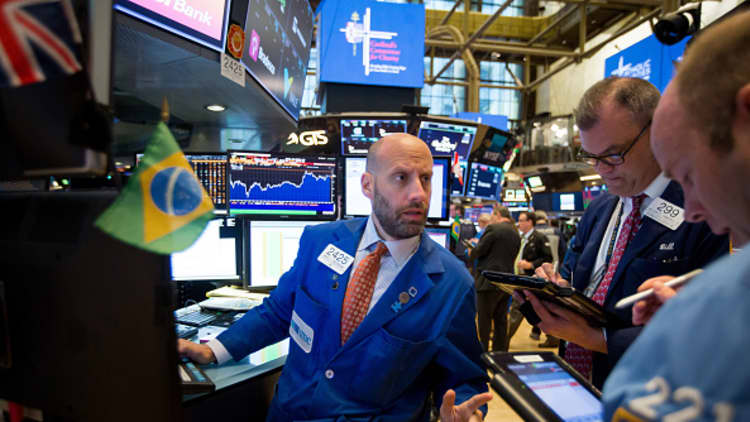
Stocks fell Monday with the Dow's losing streak stretching to five days as trade tensions linger. But investor Doug MacKay told CNBC it's only temporary.
"We're in what I would call an earnings void right now, which means all the companies from the quarter have passed through earnings," said MacKay, founder and CEO of Broadleaf Partners, an investment management firm. "We've got a few more weeks now before the earnings engine starts to pick back up again," he said on "Power Lunch."
While MacKay acknowledged that geopolitical risks often move the market, he said, "When we're not in a period of time where companies are talking things up and things are good, these issues like tariffs and whatever come to the forefront."
MacKay expects the market to turn positive soon.
Still, equities fell Monday as investors fear trade wars between the U.S. and China.
The Dow Jones Industrial Average fell 103.01 points to 24,987.47 and the S&P 500 slipped 5.79 points to 2,773.87. The Nasdaq Composite managed to rise less than a point to 7,747.02
President Donald Trump's tariffs — up to $50 billion worth of Chinese goods — could commence as early as July 6. China has already said it will retaliate with tariffs of its own.
But MacKay said tax reform, implemented earlier this year, will have a bigger impact on the market and U.S. economy than tariffs.
"And those things probably won't be kicking in until the next couple of quarters," he said.
Still, with earnings growth of more than 20 percent for the S&P in the first quarter, Erik Ristuben, global chief investment strategist at Russell Investments, said the rate of earnings will certainly slow.
"Earnings growth this late in the cycle doesn't get any better than that," Ristuben said Monday on "Power Lunch."
Whatever the reason for the recent dip in the stock market, Steve Grasso, director of institutional sales at Stuart Frankel & Co., an investment firm, said it's not due to the tariffs — because nothing tangible has actually happened yet.
"We're just chewing on headlines," Grasso, who is also a CNBC contributor, said Monday on "Closing Bell." "And the market has been chewing on these headlines for quite some time now."
Still, investors often make trades based on headlines.
And if a full-scale trade war does break out, it will likely affect all areas of the market, Jim Cahn, chief investment officer at Wealth Enhancement Group, said on "Closing Bell."
"People should be concerned," he said. "Because these things escalate very quickly."


